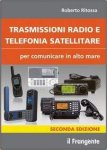RobbieW
Well-Known Member
+1 for local ham club, you'll learn loads. Though you need the advance license to transmit out at sea/anchor as a maritime mobile.
Agreed, though achieving the advance licence is no sinecure in the UK. At that level its assumed that your going to build your own station so the theory and exam are heavy on technical and electronic stuff

